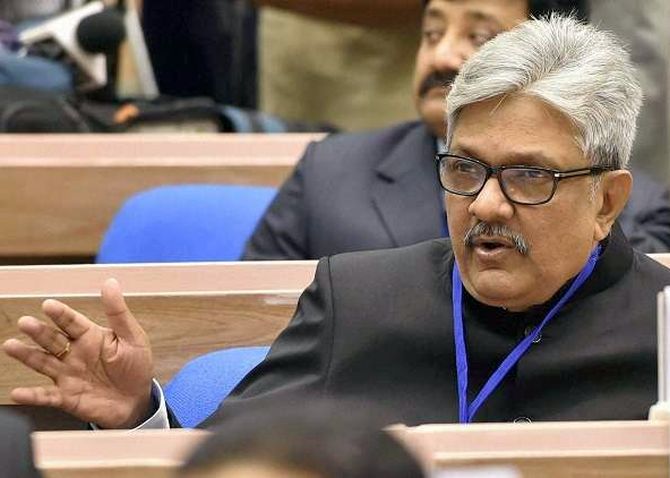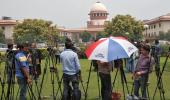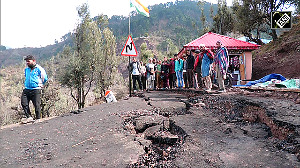Meanwhile, the government has rejected suggestions that it turned down the elevation of Justice Joseph as he had once overturned the imposition of President's Rule in Uttarakhand.

The Supreme Court collegium on Wednesday deferred a decision on the issue of reconsidering its recommendation to elevate Uttarakhand Chief Justice K M Joseph as the judge of the apex court, after it was sent back by the government last week.
The five member collegium comprising Chief Justice Dipak Misra and justices J Chelameswar, Ranjan Gogoi, Madan B Lokur and Kurian Joseph met after the top court's working hours, but no decision was taken.
Besides Justice Jospeph, the agenda of the collegium was to deliberate on the names of some judges from Calcutta, Rajasthan and Telangana and Andhra Pradesh high courts for elevation as apex court judges.
The resolution of the meeting uploaded on the apex court website said the collegium had met to consider the following agenda:
"To reconsider the case of Mr Justice K.M. Joseph, Chief Justice, Uttarakhand High Court (Parent High Court:Kerala), pursuant to letters dated April 26 and 30, 2018 received from Ministry of Law & Justice, Government of India and also to consider the names of Judges from Calcutta, Rajasthan, and Telangana & Andhra Pradesh High Courts for elevation as Judges of the Supreme Court, in view of the concept of fair representation. Deferred," the resolution said.
Justice Chelameswar, who had not attended the court on Wednesday, came for the collegium meeting.
There was no official word on when the collegium would meet next.
Justice Joseph's name was recommended along with then senior advocate Indu Malhotra on January 10 for their elevation as apex court judges.
The government had on April 26 declined to accept the recommendation of the collegium and asked it to reconsider Justice Joseph's name.
Malhotra was sworn in as the judge of the apex court on April 27.
Justice K M Joseph, who had headed the bench that had quashed the Narendra Modi government's decision to impose President's rule in the Congress-ruled hill state in 2016, was not considered to be elevated as a Supreme Court judge by the Centre.
The government had said that the proposal for his name was not in accordance with the top court's parameters and there was adequate representation of Kerala in the higher judiciary from where he hails.
His seniority was also questioned by the Centre which had said, "He stands at Sl. No.45 in the combined seniority of high court Judges on all-India basis."
Justice Joseph, who turns 60 this June, has been the Chief Justice of the Uttarakhand high court since July 2014.
He was appointed a permanent judge of the Kerala high court on October 14, 2004 and assumed charge of the Uttarakhand high court on July 31, 2014.
The members of the collegium including Justices Chelameswar, Gogoi, Lokur and Kurian Joseph had expressed concern over the delay of the government in clearing the name of the Uttarakhand Chief Justice as the apex court judge.
Notwithstanding the letters written by the collegium members to the CJI which had come into the public domain, the Centre disregarded the recommendation about Justice Joseph.
The government has rejected suggestions that it turned down the elevation of Uttarakhand high court Chief Justice K M Joseph to the Supreme Court as he had once overturned the imposition of President's Rule in the state.
Law Minister Ravi Shankar Prasad also said that it has the right to seek reconsideration of proposals sent by the Supreme Court collegium as the power flows from three apex court judgements.
The government had on April 26 asked the Supreme Court collegium to reconsider its recommendation to elevate Justice Joseph to the apex court, saying the elevation may not be "appropriate".
In a letter to Chief Justice of India Dipak Misra, Prasad had said the government's rejection of Justice Joseph's name has approval of the President and the Prime Minister and also flagged that the SCs/STs have no representation in the Supreme Court since long.
"The proposed appointment of .... Joseph as a judge of the Supreme Court at this stage does not appear to be appropriate," Prasad had said in the letter. "It would also not be fair and justified to other more senior, suitable and deserving chief justices" and senior judges of various high courts.
Responding to questions on the decision to stall Justice Joseph's appointment to the top court, Prasad said that "sponsored allegations" are being levelled against the government by "the Congress party in particular and others in general" that Joseph's appointment was stalled due to his Uttarakhand President's Rule verdict.
"I wish to deny with all authority at my command. It has nothing to do with that at all," he told reporters.
He said there are two "obvious reasons" to support his stand.
"A proper government with 3/4th majority has been elected in Uttarakhand. Second that order (of Justice Joseph) was confirmed by Justice J S Khehar of the Supreme Court, who had also set aside the National Judicial Appointments Commission Act, yet he became the CJI in the NDA government ... I deny these insinuations," the minister said.
Through the NJAC law, the government had sought to have more say in appointment of Supreme Court and high court judges.
Prasad said that the right of the government to seek a reconsideration of the proposals made by the collegium is granted to it by the Supreme Court judgements of 1993, 1998 and 2015 relating to the collegium system.
The minister refused to comment on former CJI R M Lodha's remarks on independence of judiciary, saying he would not like to comment on observations made by a retired judge.
"I always felt that independence of judiciary is non-negotiable and it is for the CJI, who is the leader of the court, to take them forward. He has to show his statesmanship qualities, take all brothers and sisters together," Lodha had said yesterday, without making any reference to the incumbent CJI Dipak Misra.
"Only one things I would like to observe is the commitment of this government for the independence of the judiciary and respect for the institution of judiciary and the judges is complete and uncompromising," Prasad said.











 © 2025
© 2025